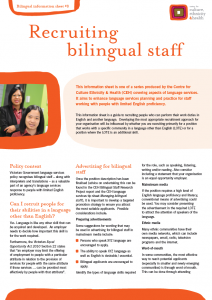How Can We Help?
 This resource is also available in pdf.
This resource is also available in pdf.
Download Recruiting bilingual staff
Access other tip sheets in this series
Policy context
Victorian Government language services policy recognises bilingual staff – along with interpreters and translations – as a valuable part of an agency’s language services response to people with limited English proficiency.
Can I recruit people for their abilities in a language other than English?
Yes. Language is like any other skill that can be acquired and developed. An employer needs to decide how important this skill is for the work required. Furthermore, the Victorian Equal Opportunity Act 2010 Section 22 states that “an employer may limit the offering of employment to people with a particular attribute in relation to the provision of services for people with the same attribute if those services … can be provided most effectively by people with that attribute”.
Advertising for bilingual staff
Once the position description has been finalised (advice on undertaking this can be found in the CEH Bilingual Staff Research Project report and the CEH language services tip sheet Managing bilingual staff), it is important to develop a targeted promotion strategy to ensure you attract the most suitable applicants. Possible considerations include:
Preparing advertisements
Some suggestions for wording that may be used in advertising for bilingual staff in mainstream media include:
- Persons who speak XYZ language are encouraged to apply.
- The ability to speak XYZ language as well as English is desirable / essential.
- Bilingual applicants are encouraged to apply.
Identify the types of language skills required for the role, such as speaking, listening, writing and/or reading. Also consider including a statement that your organisation is an equal opportunity employer.
Mainstream media
If the position requires a high level of English language proficiency and literacy, conventional means of advertising could be used. You may consider presenting the advertisement in the required LOTE to attract the attention of speakers of the language.
Ethnic media
Many ethnic communities have their own media networks, which can include newspapers, email, radio, television programs and the internet.
Word-of-mouth
In some communities, the most effective way to reach potential applicants (especially in smaller and newly emerging communities) is through word-of-mouth. This can be done through attending information sessions and community events, and visiting community organisations.
Existing networks and key institutions
Consider using organisations that engage with people from the relevant communities to assist you to promote the vacant position, such as the Adult Multicultural Education Service (AMES), English language schools, TAFE English as a second language departments, migrant resource centres, ethno-specific organisations and religious institutions. You can also advertise in school newsletters and community information bulletins, or through informal networks and other organisations.
The job application and interview process
The conventional job application and interview processes may be unfamiliar to people who have experienced different work cultures. Strategies to ensure such applicants have the opportunity to present effectively include providing applicants with guidelines covering how to prepare a resume, address key selection criteria and fill in an application, and information about what to expect from an interview. Consider conducting an information session for potential candidates to:
- Assist applicants to better understand the position and the organisation
- Enable the organisation to meet potential applicants and learn about the pool of applicants
- Assist applicants to prepare a written application, if one is required.
For certain roles, you could be flexible in how applicants can respond to the advertisement and consider an alternative to written applications, such as a verbal application.
Conducting the interview
Different cultural communication styles can influence the capacity of an applicant to respond during an interview. Consider consulting with somebody from the same community about the structure of the interview and the type of questions.
Assessing language skills
It is important to conduct a language assessment of the applicant’s LOTE and/ or English skills. Before doing this, decide which language skills you need to assess. To assess language capacity, consider including a person that speaks the same language on the panel.
Supporting your new bilingual employee
All new staff members require support to settle into their new position. When recruiting for LOTE skills, consider there may need to be additional support for English language proficiency and literacy, and a period of acculturation to an Australian workplace.
Links to other tip sheets in the language services series
This information sheet is one of a series produced by the Centre for Culture Ethnicity & Health (CEH) covering aspects of language services. Other tip sheets in this series include:
- Interpreters: an introduction (2014): Interpreting is the oral translation of speech between two different spoken languages…
- Assessing the need for an interpreter (2014): Whenever possible, the need for an interpreter should be decided before an appointment…
- Booking and briefing an interpreter (2014): Getting the best interpreter starts at the booking stage.
- Communicating via an interpreter (2014): Here are some tips to make the interpreted conversation more effective and efficient…
- Debriefing with an interpreter (2014): The debriefing a mutual learning process and contributes to a higher quality of communication…
- Translation: an introduction (2014): Translation means converting written information from one language into another…
- Planning for translation (2014): Undertaking translation is a process and should be considered a project with a budget and timelines…
- Managing bilingual staff (2014): Bilingualism is the ability to communicate in two languages with equal, or near equal, fluency…
- Developing a comprehensive language services response (2014): Language services encompass a range of services that facilitate communication with clients with limited English language proficiency…
Resource Type: Tip/Fact Sheets

 This resource is also available in pdf.
This resource is also available in pdf.